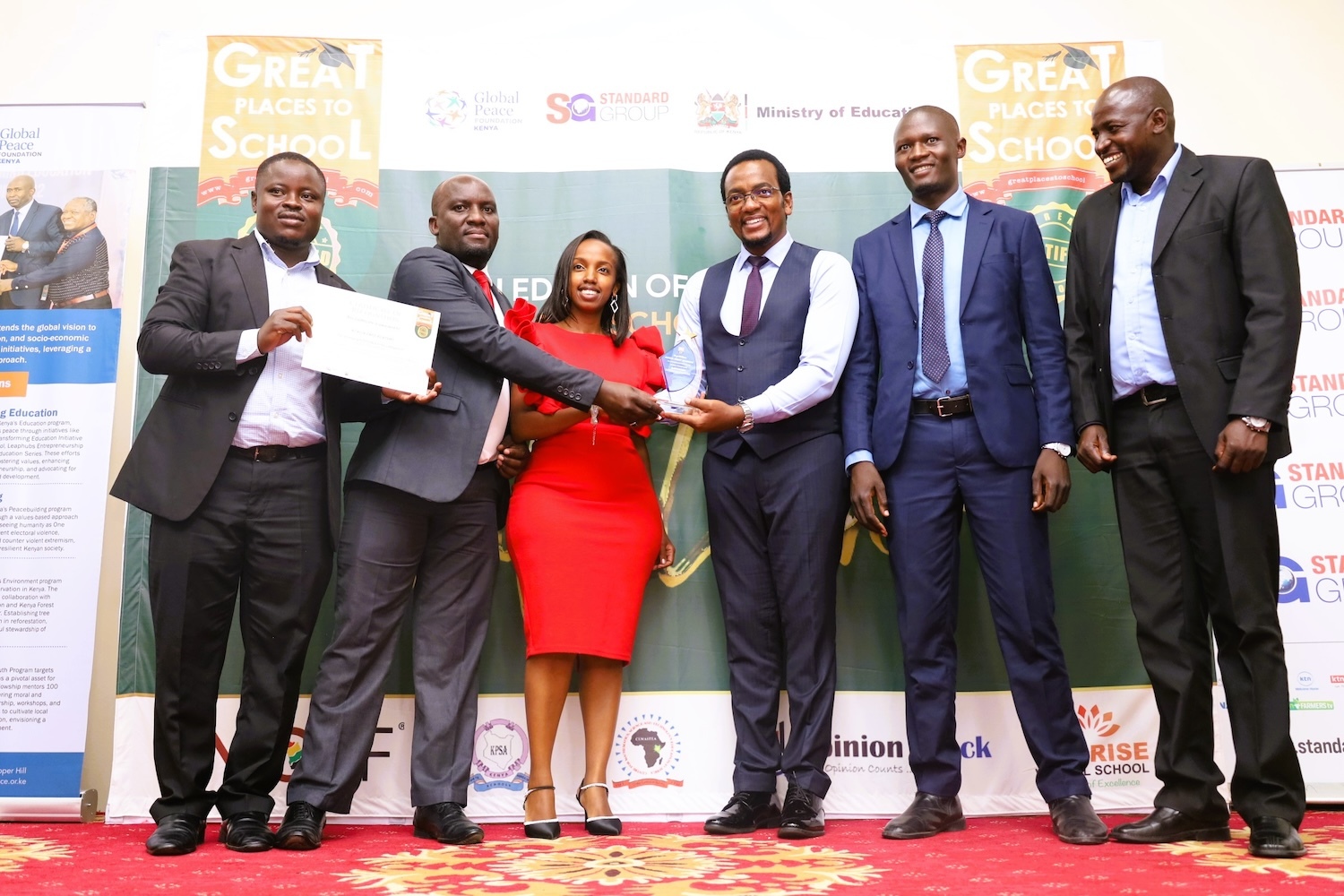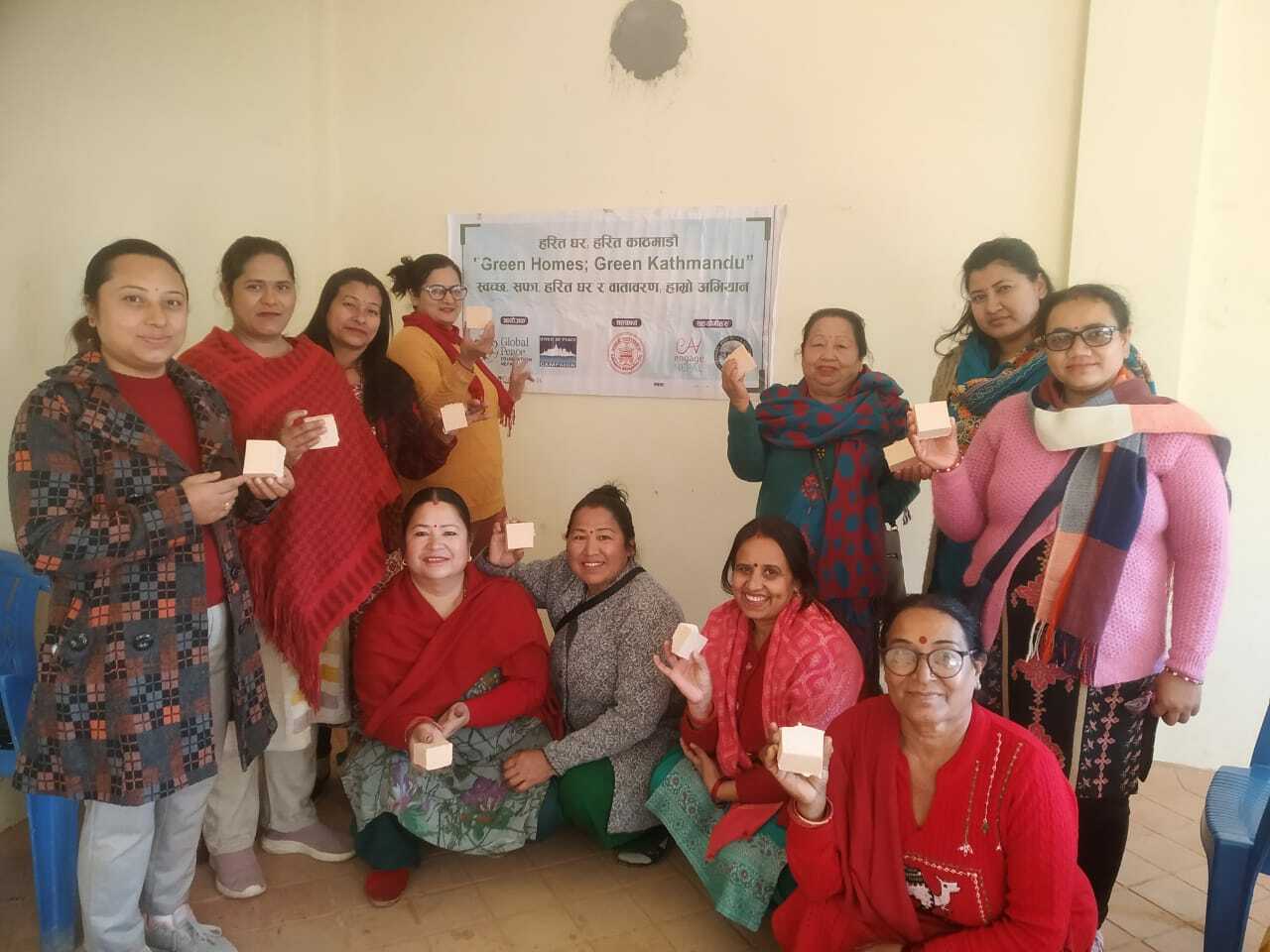International human rights experts and North Korean defectors discussed the brutal realities of repression, starvation, imprisonment, and executions of Koreans living in the North at the most recent International Forum on One Korea in Seoul on September 30, 2022.
The forum, “Freedom and Human Rights: International Cooperation for Reforming the Political and Financial System in North Korea,” explored strategies to reform the 73-year-old Kim family dictatorship and was hosted in recognition of North Korea Freedom Week.
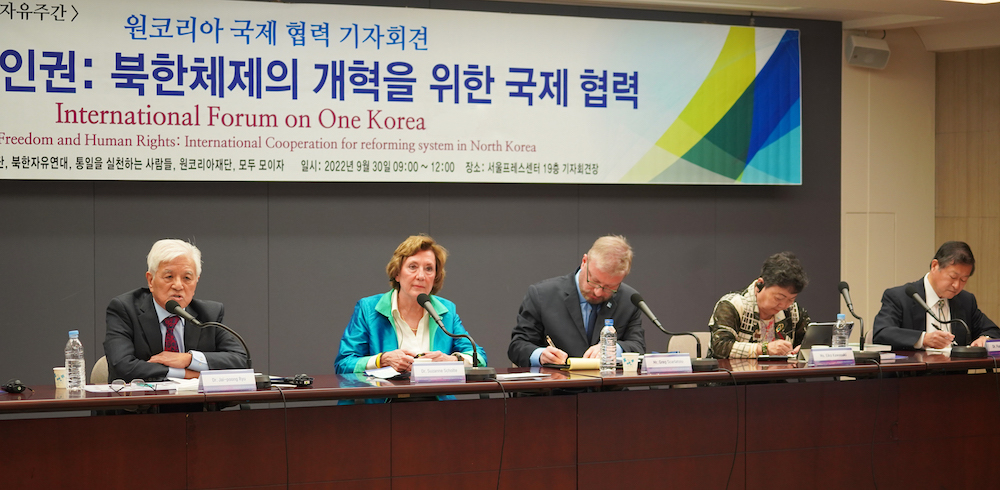
In 2005 the North Korea Freedom Coalition–composed of NGOs in the USA, Japan, and South Korea, and North Korean defectors’ organizations–inaugurated North Korea Freedom Week to raise public awareness about human rights violations committed against North Koreans.
The U.S. Congress passed the North Korea Human Rights Act in 2004 to support North Korean refugees and Koreans living in the North, and several Congressional members expressed solidarity with North Koreans through video messages that were presented during the forum.
The international panel of human rights advocates included Dr. Suzanne Scholte, Chair of the North Korea Freedom Coalition; U.S. Col. David Maxwell, Senior Fellow at the Foundation for Defense of Democracies; Hyunseung Lee, a North Korean defector and Fellow at the Global Peace Foundation; Greg Scarlatoiu, Secretary General of the Committee for Human Rights in North Korea; and Enes Kanter Freedom, a US NBA player and human rights advocate.
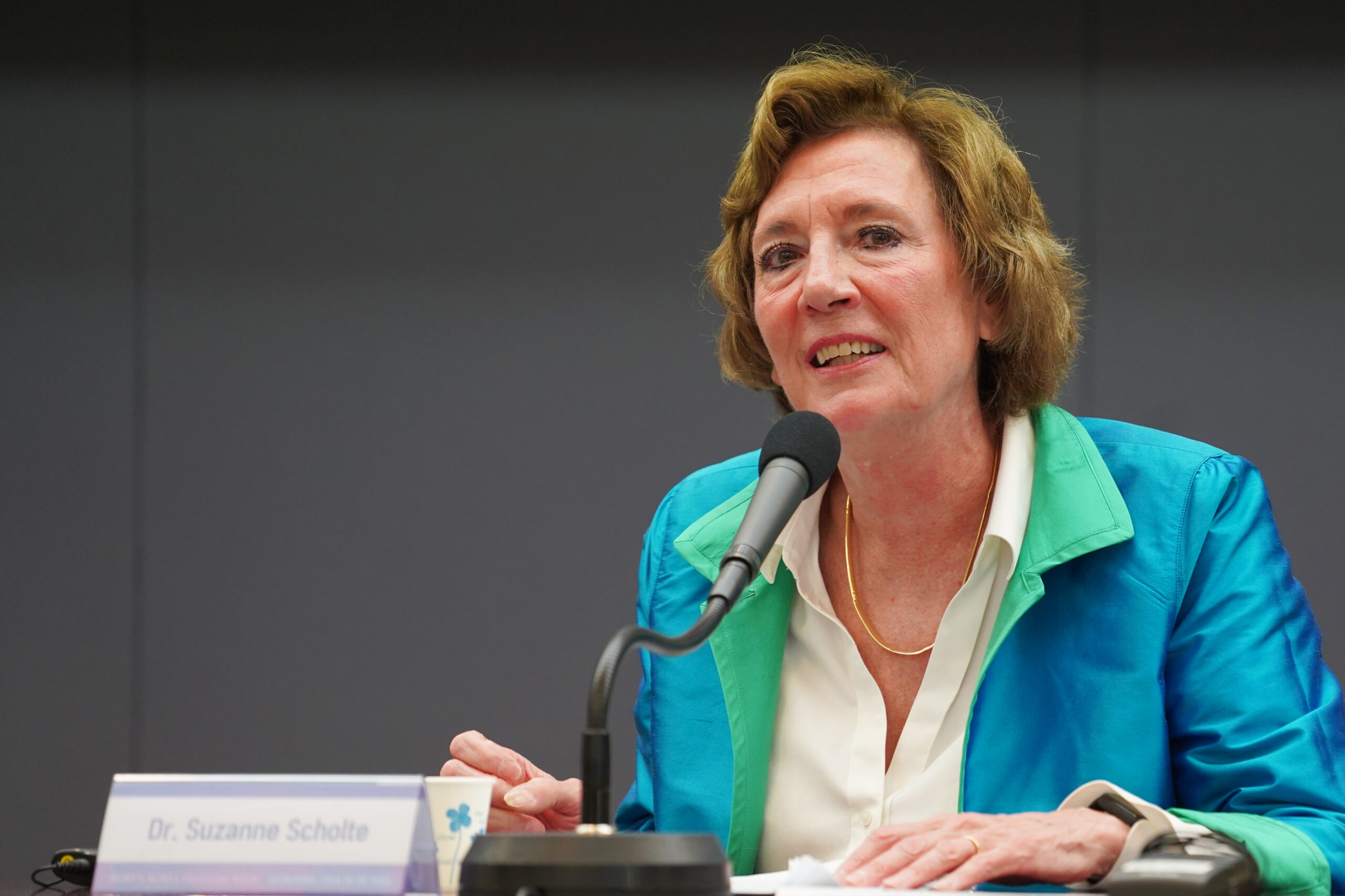
Dr. Suzanne Scholte, an international expert on North Korean human rights abuses
Dr. Schulte noted that South Korean President Yoon Suk-yeol won the election by the narrowest margin because of the actions of North Korean escapees who suffered tremendous repression under the pro-Kim Jong-un policies of Moon Jae-in administration. “North Korea escapees saw the election as literally life and death,” she said, adding that the Moon administration made a deal to block all information going to North Korea. The Moon-backed anti-leaflet law to prohibit sending information to North Korean people “was violation of South Korean law, the right of freedom to speak and impart information in all media,” Dr. Schulte said. “The Achilles heel of North Korea is human rights,” she told the forum. “We should be doing everything in our power, by air, land, and sea, to provide information to North Korea.”
Describing the sufferings of North Koreans under the Kim dictatorship, Col. David Maxwell said three types of effort were required to support the freedom and liberation of North Koreans: a “human rights upfront approach, an information campaign, and the pursuit of a free and unified Korea. “Human rights is not only moral imperative but national security issue,” Col. Maxwell said.
Other panelists said that both strategically and morally, human rights should drive international policy for change in North Korea. Making nuclear disarmament a precondition for aid and reform has proven to be a failed approach, panelists said.

From left: Greg Scarlatoiu, Secretary General of the Committee for Human Rights in North Korea; Hyunseung Lee, a North Korean defector and Fellow at the Global Peace Foundation; and Kook-han Moon, President of the North Korea Human Rights International Association.
Three panelists based in Japan recounted the human tragedy and deception of the North Korean Repatriation campaign, a program to relocate more than 90 thousand Koreans living in Japan to North Korea that was implemented from 1959 to 1984. Panelists Eiko Kawasaki, Chair of Action for Korea United Japan and Chair of Korea of All; Dr. Fumiake Yamada, Emeritus Chair of the Society to Help Returnees to North Korea; and Yoonbok Song, Vice President of No Fence, described the brazen propaganda that presented North Korea as a “paradise of earth” where all one’s needs would be met, which enticed Japanese residents. The reality of starvation, discrimination, forced labor and internment was very different than the promises.
Dr. Yamada said the support of North Korean criminal acts by China and Russia needed to be countered by the international community. Just as Russian President Putin has been isolated and “cornered” by the international response to the invasion of Ukraine, freedom-loving nations should work together to protect human rights beyond international borders. The repatriation program should be presented as a historical record, part of school curricula, said Yoonbok Song, so future generations of children will remember the experience of abductees and the lessons of history.
“The Achilles heel of North Korea is human rights. We should be doing everything in our power, by air, land, and sea, to provide information to North Korea.”
Korean panelists Kwang-joo Sohn, Chair of the Korean Network for Advanced Country and former Chairman of the Korea Hana Foundation; Kook-han Moon, President of the North Korea Human Rights International Association; and Chul-hwan Kang, President of the North Korea Strategy Center closed out the forum by urging the international community and the incoming Yun administration to better understand the significance of ideology in the efforts to bring reform to North Korea.
Kwang-joo Sohn said that summits between the two Koreas since 2000 had only resulted in failure. Stressing the economic, strategic, and ideological advantages of the free-nation alliance, he said North Korea nevertheless was able to drive to negotiations because of the misplaced emphasis on denuclearization. “Democratic values in South Korea are more powerful than nuclear weapons in the North,” Sohn said.
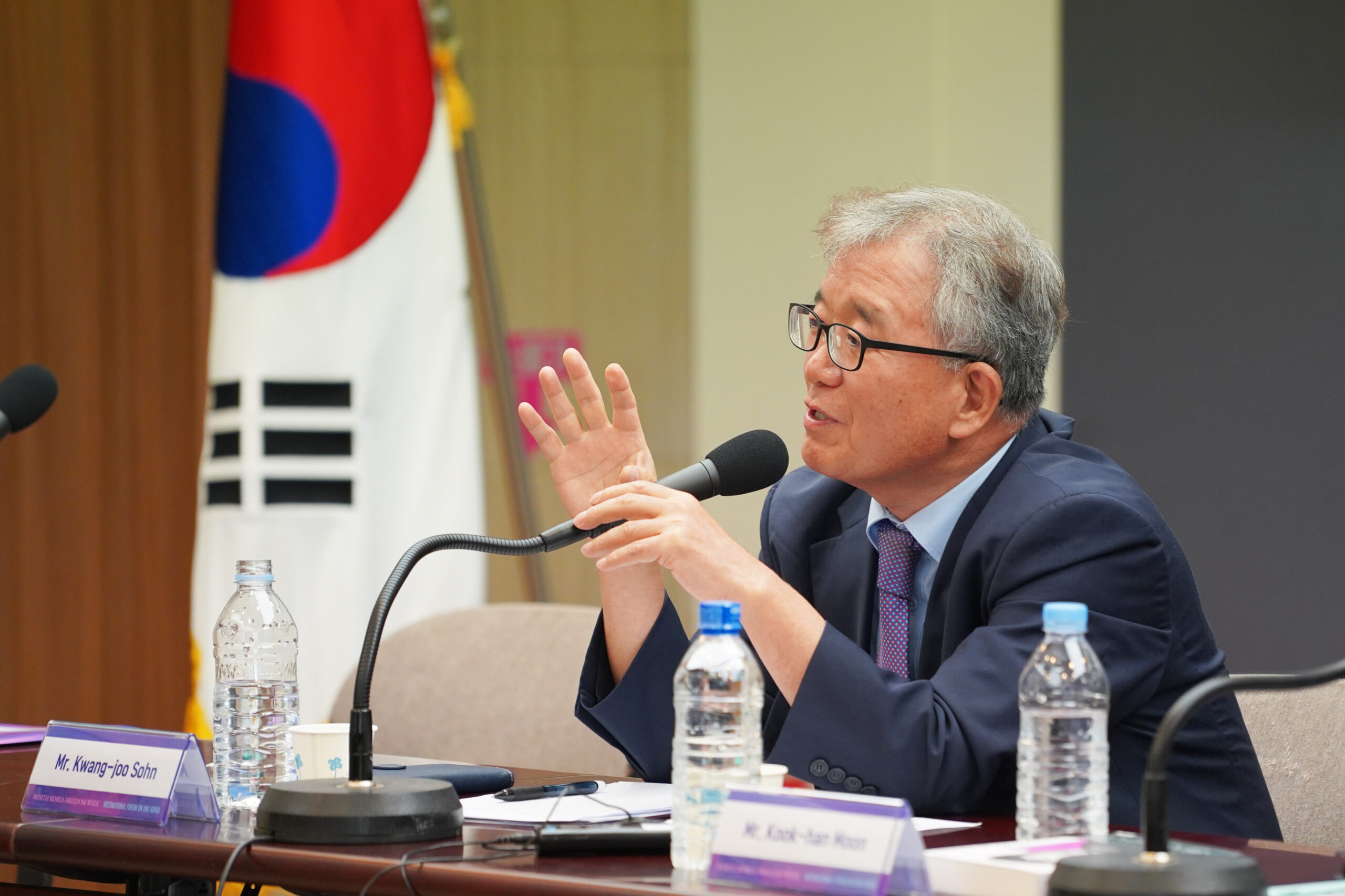
Kwang-joo Sohn, Chair of the Korean Network for Advanced Country, addresses the forum
Korean panelists again stressed the power of information, confronting the North’s autocratic ideology with an ideology of freedom and human rights. Kook-han Moon credited Action for Korea United, a coalition of some 1000 civil society organization in South Korea, for developing a broad, inclusive approach to the North Korean military threat and human rights abuses. Proposing a major reunification Expo within three years, he said such an event could launch a “great awakening” that could mobilize domestic and international support to confront North Korea and usher in fundamental reform, leading to a free and unified Korea.
The forum, “Freedom and Human Rights: International Cooperation for Reforming the Political and Financial System in North Korea,” was co-convened by the Global Peace Foundation, North Korea Freedom Coalition, Action for Korea United, One Korea Foundation, Korea of All, and the International Coalition for Religious Freedom in North Korea.
The International Forum on One Korea is an ongoing series of forums organized by the Global Peace Foundation and co-conveners over the last decade to advance global support for a free and united Korea to resolve the security and human rights issues on the divided peninsula. For more information visit International Forum on One Korea – Virtual Forum Series | Global Peace Foundation and for information of broader efforts to advance Korean reunification visit One Korea Global Campaign towards a Free and Unified Korea | Global Peace Foundation

